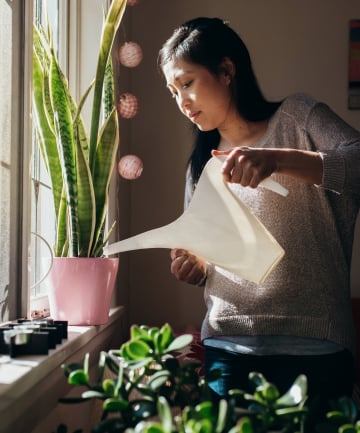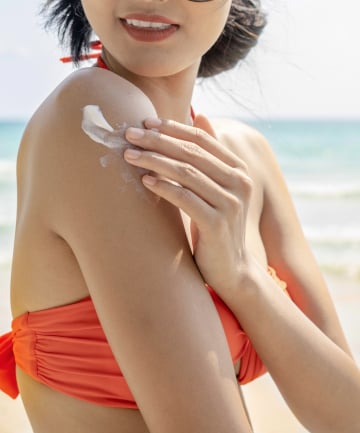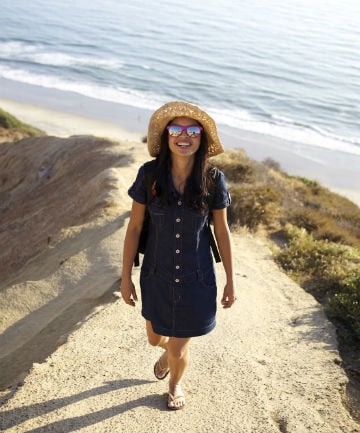Our daily routines are full of practices that keep us healthy, happy, and fit. What many people don't realize is that applying sunscreen — much like brushing your teeth, or drinking your morning coffee — is an important everyday habit, too.
And yes, maybe you diligently wear your sunscreen when you're lounging poolside, or heading out for a beach day — but dermatologists everywhere will tell you that you should really be wearing the stuff 365 days out of the year.
So, if you're wondering why it's so important to wear sunscreen daily — and how to best add it to your routine — keep on reading!
Image via Imaxtree
And yes, maybe you diligently wear your sunscreen when you're lounging poolside, or heading out for a beach day — but dermatologists everywhere will tell you that you should really be wearing the stuff 365 days out of the year.
So, if you're wondering why it's so important to wear sunscreen daily — and how to best add it to your routine — keep on reading!
Image via Imaxtree
Put simply, ultraviolet (UV) light is a type of radiation that comes from the sun. As you might expect, it is strongest in warm, bright climates and weather — but rest assured, if there is daylight, there's enough UV light to damage your skin. That's why sunscreen essential for every kind of weather... even through clouds, rain, or snow.
And yes: It's essential even if you don't plan on going outside. The windows in your car, home, and office may not offer enough defense against UV rays; nor will your favorite slouchy Madewell T-shirt. Broad-spectrum sunscreen is a necessity, even if you are just commuting to and from work, or sitting in a room with windows enjoying a book.
In the short term, inadequate protection against UV light causes damage in the form of sunburns and tans (and, yes, a tan is damage). And over the long term, scientists have attributed 90 percent of skin cancers and 90 percent of the visible signs of aging (aka wrinkles, sunspots, discoloration, and saggy skin) to cumulative UV exposure.
... Which is precisely why the American Academy of Dermatology recommends that everyone apply a broad-spectrum sunscreen with an SPF of 30 or higher, full stop — no matter where you are or who you are or what your skin tone is. It may sound like a big commitment, but once you learn what works for you, it's an easy habit to keep.
Image via LOUISE BEAUMONT/Getty
And yes: It's essential even if you don't plan on going outside. The windows in your car, home, and office may not offer enough defense against UV rays; nor will your favorite slouchy Madewell T-shirt. Broad-spectrum sunscreen is a necessity, even if you are just commuting to and from work, or sitting in a room with windows enjoying a book.
In the short term, inadequate protection against UV light causes damage in the form of sunburns and tans (and, yes, a tan is damage). And over the long term, scientists have attributed 90 percent of skin cancers and 90 percent of the visible signs of aging (aka wrinkles, sunspots, discoloration, and saggy skin) to cumulative UV exposure.
... Which is precisely why the American Academy of Dermatology recommends that everyone apply a broad-spectrum sunscreen with an SPF of 30 or higher, full stop — no matter where you are or who you are or what your skin tone is. It may sound like a big commitment, but once you learn what works for you, it's an easy habit to keep.
Image via LOUISE BEAUMONT/Getty
Luckily, there are so many different formulations — from SPF moisturizers, to sun sticks, to UV-protecting powders — available, so you can easily fit a broad-spectrum sunscreen into your morning routine. Just take the time to find which product(s) work best for you and your habits to ensure you'll actually use it every day.
You might even want to combine your products to keep your routine streamlined — for example, you could apply a product that doubles as a sunscreen and a facial moisturizer, or swap a tinted sunscreen for your regular foundation.
When it comes down to it, make SPF your skin care priority. So you should look for products that list sunscreen as a primary active ingredient — and always be conscious of product labeling: Look specifically for the words "broad spectrum" and ensure that the SPF is 30 or higher. (Lots of lotions and tanning oils marketed for sun care do not actually meet this standard of protection, so you need to be careful.)
Image via boonchai wedmakawand/Getty
You might even want to combine your products to keep your routine streamlined — for example, you could apply a product that doubles as a sunscreen and a facial moisturizer, or swap a tinted sunscreen for your regular foundation.
When it comes down to it, make SPF your skin care priority. So you should look for products that list sunscreen as a primary active ingredient — and always be conscious of product labeling: Look specifically for the words "broad spectrum" and ensure that the SPF is 30 or higher. (Lots of lotions and tanning oils marketed for sun care do not actually meet this standard of protection, so you need to be careful.)
Image via boonchai wedmakawand/Getty
Don't be too scared of the sun, though: Life should be enjoyed to its fullest, and exposure to nature in all of her forms — the sun included — is good for the mind, body, and soul. The key is to take steps to support and protect your skin through daily SPF application (an re-applications, of course).
Plus, you can go above and beyond sunscreen use — for example, if you're looking to hit the beach, enjoy the view and sound of the crashing waves... from under an umbrella. Or, if you're hiking up mountains to picnic with friends, wear a broad-brimmed hat and sunglasses. You can even get special window treatments for your living area to cut down on incidental UV exposure.
Lastly, make sure to visit a board-certified dermatologist at least once a year for a skin cancer screening and up-to-date guidance on general skin health. Our skin is tasked with the important and constant job of protecting us, so protect it back — and wear sunscreen daily.
Image via Priscilla Gragg/Getty
Plus, you can go above and beyond sunscreen use — for example, if you're looking to hit the beach, enjoy the view and sound of the crashing waves... from under an umbrella. Or, if you're hiking up mountains to picnic with friends, wear a broad-brimmed hat and sunglasses. You can even get special window treatments for your living area to cut down on incidental UV exposure.
Lastly, make sure to visit a board-certified dermatologist at least once a year for a skin cancer screening and up-to-date guidance on general skin health. Our skin is tasked with the important and constant job of protecting us, so protect it back — and wear sunscreen daily.
Image via Priscilla Gragg/Getty









